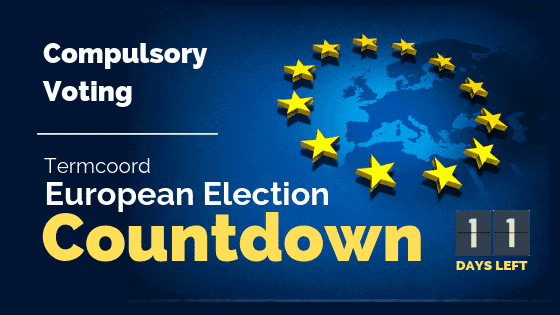
If you are a citizen of a European Union member state, you have the right to cast your vote and also to stand as a candidate to the European elections that will take place from the 23-26 May, 2019.
The EU counts with more 500 million of inhabitants, of which 350 million are eligible to vote for the European elections at the end of this month. With a high number of population, the EU constitutes one of the biggest electorates in the world to democratically choose what will affect the EU in its bigger picture. However, all countries are different and so are their methods and rules for voting.
Actually, to go and vote is quite simple, if you live in your home country; the electoral system will be the same as for any other local elections taken in your country. However, if you are living in another country of the European Union, you will have to vote under the same conditions as nationals of the country you live in. And, you cannot vote from a country outside the EU.

As mentioned, the countries have different rules and provisions for voting. For example, some countries have compulsory voting. It means that voting for the European elections is compulsory either in both your home country or in your host country, or in just one of them. If you live in a country with compulsory voting, your obligation to vote is just the same as for the nationals of the country you are in.
The compulsory voting also implies that in these countries the electoral participation is legally required, and non-voters can face fines. The concept of compulsory voting is to show that democracy is not just about having the right to vote but also to acknowledge that it is a citizen’s duty as well. The purpose of this obligation is ensuring an electoral equality in the representation of all social groups.
The voting is compulsory in the following countries: Belgium, Bulgaria, Cyprus, Greece and Luxembourg.
Please remember, you can only vote once at the European elections! Do you know already whom you are voting for? Please follow this link to know more about the European Parties:
http://termcoord.eu/2019/05/termcoord-european-election-countdown-political-parties/
Sources:
Encyclopedia Britannica. (2019). Election – Voting practices. [online] Available at: https://www.britannica.com/topic/election-political-science/Voting-practices#ref763447 [Accessed 15 May 2019].
Euronews.com. (2019). [online] Available at: https://www.euronews.com/2019/05/15/european-parliament-elections-2019-all-you-need-to-know-about-how-they-work [Accessed 15 May 2019].
Europarl.europa.eu. (2019). [online] Available at: https://www.europarl.europa.eu/RegData/etudes/ATAG/2018/623556/EPRS_ATA(2018)623556_EN.pdf [Accessed 15 May 2019].
Europarl.europa.eu. (2019). Home. [online] Available at: http://www.europarl.europa.eu/unitedstates/en/ [Accessed 15 May 2019].
Expatica. (2019). How to vote in the 2019 European Parliament election | Expatica. [online] Available at: https://www.expatica.com/about/gov-law-admin/how-to-vote-in-the-2019-european-parliament-election-8786/ [Accessed 15 May 2019].
Luxembourg.public.lu. (2019). European Elections. [online] Available at: http://luxembourg.public.lu/en/le-grand-duche-se-presente/systeme-politique/systeme-electoral/europennes/index.html [Accessed 15 May 2019].
Your Europe – Citizens. (2019). European Parliament elections. [online] Available at: https://europa.eu/youreurope/citizens/residence/elections-abroad/european-elections/index_en.htm [Accessed 15 May 2019].
Written by Maria Blanca Escudero Fontan, trainee in the Direction of the Directorate B. Graduated with a BA in Translation and Interpretation (uVigo) and a Masters in International Studies (USC, Galicia).

